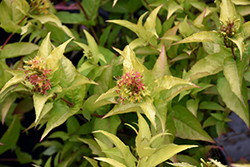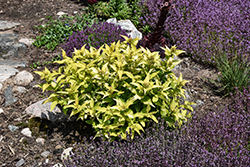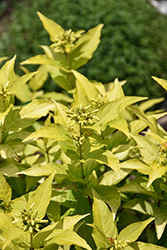>> Home
Honeybee™ Bush Honeysuckle
Diervilla rivularis 'Diwibru01'
Height: 4 feet
Spread: 4 feet
Sunlight:
![]()
![]()
Hardiness Zone: 4a
Description:
This small to medium shrub features bright yellow emerging foliage that matures to gold; clusters of yellow flowers in summer are popular with bees and butterflies; drought tolerant, adaptable to various soils, and tolerates dry shade
Ornamental Features
Honeybee™ Bush Honeysuckle features showy panicles of yellow trumpet-shaped flowers along the branches from early summer to early fall. It has attractive gold foliage with hints of light green which emerges yellow in spring. The pointy leaves are highly ornamental and turn outstanding shades of coppery-bronze and in the fall.
Landscape Attributes
Honeybee™ Bush Honeysuckle is a dense multi-stemmed deciduous shrub with a mounded form. Its relatively coarse texture can be used to stand it apart from other landscape plants with finer foliage.
This shrub will require occasional maintenance and upkeep, and is best pruned in late winter once the threat of extreme cold has passed. It is a good choice for attracting bees and butterflies to your yard. Gardeners should be aware of the following characteristic(s) that may warrant special consideration;
- Suckering
Honeybee™ Bush Honeysuckle is recommended for the following landscape applications;
- Mass Planting
- General Garden Use
- Naturalizing And Woodland Gardens
- Container Planting
Planting & Growing
Honeybee™ Bush Honeysuckle will grow to be about 4 feet tall at maturity, with a spread of 4 feet. It tends to fill out right to the ground and therefore doesn't necessarily require facer plants in front. It grows at a medium rate, and under ideal conditions can be expected to live for approximately 20 years.
This shrub does best in full sun to partial shade. It is very adaptable to both dry and moist growing conditions, but will not tolerate any standing water. It is not particular as to soil type or pH. It is somewhat tolerant of urban pollution. This is a selection of a native North American species.
Honeybee™ Bush Honeysuckle makes a fine choice for the outdoor landscape, but it is also well-suited for use in outdoor pots and containers. Because of its height, it is often used as a 'thriller' in the 'spiller-thriller-filler' container combination; plant it near the center of the pot, surrounded by smaller plants and those that spill over the edges. It is even sizeable enough that it can be grown alone in a suitable container. Note that when grown in a container, it may not perform exactly as indicated on the tag - this is to be expected. Also note that when growing plants in outdoor containers and baskets, they may require more frequent waterings than they would in the yard or garden. Be aware that in our climate, most plants cannot be expected to survive the winter if left in containers outdoors, and this plant is no exception. Contact our experts for more information on how to protect it over the winter months.


